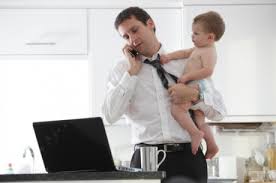Are working dads getting a raw deal? That’s the question one British inquiry is asking as it explores the barriers facing men who want to take an active role in raising their children.
For centuries, women have been considered the majority caregivers but attitudes have changed over the last few decades and many fathers are now favouring a hands-on approach at home – so what’s the problem?
Well, according to activist group Fathers4Justice, rigid stereotypes mean many new dads face stigmatisation for taking parental leave while a lack of flexible working limits their family time.
"Dads need to feel that they can take parental leave and be encouraged to do so,” founder Matt O’Connor told the Thomson Reuters Foundation. “We need to ditch this baggage that says 'men go to work, women stay at home,' – it’s rubbish, change it, it's antiquated.”
Adrienne Burgess, joint chief executive of the Fatherhood Institute, said employers had a key role in changing attitudes and well-established practices.
“(We need) forward-thinking employers who normalise active fatherhood among their employees, actively seeking to help fathers be the kinds of dads they aspire to be,” said Burgess.
Last year, the Fatherhood Institute’s Fairness in Families Index found that British parents are among the worst in the developed world for sharing childcare duties, with fathers spending 24 minutes with their children for every hour that women do.
The report also pointed to three key factors inhibiting gender equality around looking after children – pay gap, an unequal parental leave system and mother-centric family services.
Maria Miller, chair of the Women and Equalities Select Committee, agreed that the gender pay gap was indisputably linked to the parenting imbalance.
“Until fathers can take up more parental responsibility, particularly when their children are very young, we won’t see a reduction in the gender pay gap,” she said.
Recent stories:
Amazon announces colossal hiring plan
Flexible work a cure for holiday blues?
Why emotional intelligence isn’t all it’s cracked up to be

